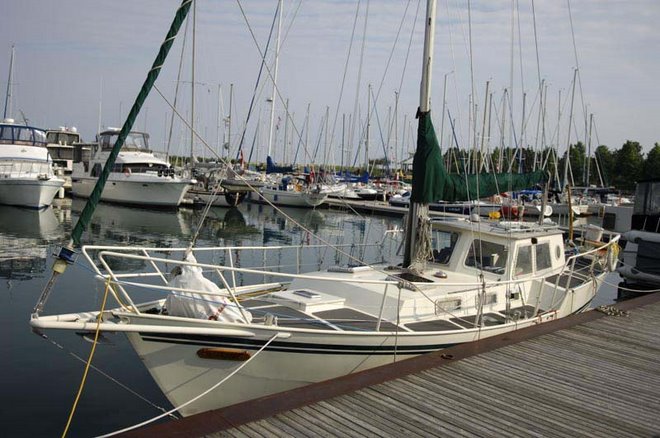 |
| The tender's come adrift! |
Interesting start to what promises to be an active year on the boating front. Having arisen rested and refreshed from the festivities of the last day of 2015, I checked my e-mail only to see that my only inbox entry was from the manager of my boat club:
"I wanted to let you know that when I arrived at the club this morning I
noticed something that’s been stored on your deck has come adrift and is
about to fall off your port side. You may want to come have a look at
your earliest opportunity
to avoid any damage."
Auld line snagged?
No, just a knot flogged loose. The Portabote in question,
The Permanent Crimson Assurance, had slid its lifting body-shaped self from the pilothouse roof, but was constrained at one end to a rail. Looked worse than it was, really. A few pokes with a ladder and a few fresh lashings later and it was returned to non-alarming status.
 |
| The hatch view, 2016: Boom and Bote back. Note the El Niño effect in the absence of ice in the basin. |
I took the unscheduled visit to bring down some coveted Yuletide sailor-type presents I received from Mrs.
Alchemy and the increasingly taller Cabin Boy: a pair of ship's clocks (battery type) I have asked "Sailor Santa" for many a time. The left-hand clock is a regular clock with a tide arm: you figure out when high tide is at the location you are, move the red arm to the middle of it, and then you know as long as you stay in the same spot when the tides are. In much of the world, this is not particularly dramatic an event or even critical knowledge to possess, but if you are, say, getting in a tender in Brittany or Nova Scotia, to return to the boat, you very much want to know the hours when the tides are at their lowest ebb. Saves on rowing, screaming.
 |
| The sharper-eyed will note that the Zulu clock is not, in fact, set to GMT. I want to "rate" the clocks to see if they run fast or slow compared to a trusted source (a radio time signal) and I'll adjust the Zulu clock later. |
The second clock on the right is called by a number of names:
"Zulu" clock (from the old terminology of calling 0000h Greenwich Mean Time (GMT or "Zulu" or "Z"), a "radio room" clock or a 24-hour clock. Even though the Greenwich time as a "standard" has been eclipsed by
"Coordinated Universal Time", an internationally standardized measurement that involves atomic clocks and virtual longitudes and not things that tick in perfidious Albion, a lot of sailors still use the phrase "Greenwich" or "Zulu" for the nautical associations, as the whole point of agreed-upon time standards was driven by that need to determine location at sea. Indeed, it's still called
nautical time, and involves some radio usage conventions I will discuss once I've fired up the SSB aboard..
 |
| A product of the British Empire, minus the sunset. |
For the purposes of using a sextant or a radio, convention states that there's two types of time, "ship time", which is just the time on the boat reflecting local noon and which will be advanced or rolled backed based on longitude east or west of Greenwich's longitude, and the time it happens to be in Greenwich, now inside London, but once
an observatory with a sideline in longitude. The story of the painful ascertation of longitude in the 18th century
has been told elsewhere, but the upshot is that if you know local noon (discoverable via sextant aboard one's vessel) and you know the time in London at zero degrees of longitude (an arbitrary distinction that is nonetheless essential), you can figure out where you are on the surface of the oblate spheroid we call home. Particularly the damper parts in which we are interested.
 |
| Looking over the deck of a Whitby 45 to the west to reveal the under-snowed New Year's Day. |
Anyway, the installation of radio room clocks suggests the installation of a radio, in this case, an
ICOM M-802. While it makes more sense to do that with the mast in and the weather warmer, the prep for that will precede it in the form of a house battery bank and
all sorts of special wiring and installation provisions to keep our "rig" fully functional and, naturally, bone dry.
The year 2016 will likely be the last one in which we live in our house, either because we'll move aboard or sell it for a smaller house which we will rent out entire, instead of having two pairs of tenants (more money, but also more headaches). Despite my recent run of silence, I expect the pace of change and improvement to continue this year, as well as the actual adventure of sailing our passagemaker. With intent.







2 comments:
Won't those fenders bouncing around all winter in the wind leave marks on your hull ?
William B. Kelleher
They haven't to date, but I suppose I could take them off. I know they've kept the ladders of my neighbours from chipping the paint, however, because I've been aboard when someone's banged a fender instead of the hull.
Post a Comment